The healthcare industry is evolving at an unprecedented pace, and technology is playing a critical role in shaping the future of healthcare.
In recent years, chatbots have emerged as a powerful tool for enhancing the patient experience and streamlining healthcare operations.
With the advent of advanced AI technologies, chatbots are becoming more innovative and sophisticated, offering a wide range of services to patients and healthcare providers.
In this article, we will explore the potential of healthcare chatbots and their role in revolutionizing the future of patient care in 2023.
Healthcare Chatbots: The Basics
Healthcare chatbots are AI-powered tools designed to automate routine tasks and provide information.
They use natural language processing and machine learning algorithms to understand and respond to patient queries, making them a convenient and efficient tool for patients.
Healthcare chatbots can be integrated into healthcare websites and mobile apps, providing patients easy access to information and support.
The Different Types of Healthcare Chatbots
There are various healthcare chatbots, each with unique features and functions.
Symptom Checker Chatbots
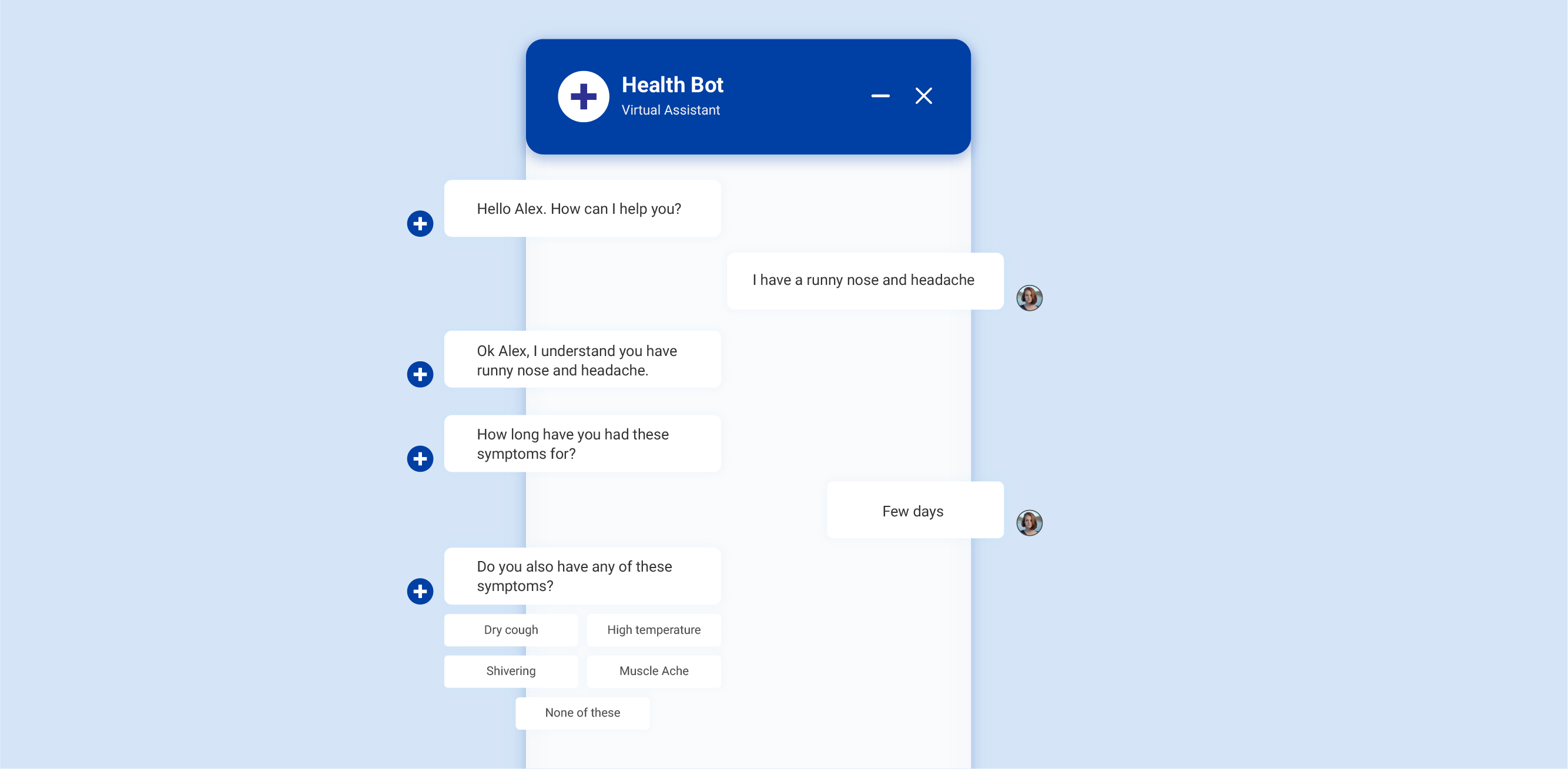
It will help patients identify their symptoms and suggest possible diagnoses.
Patients can type in their symptoms, and the chatbot will provide a list of potential health conditions based on the symptoms they have described.
For example, the chatbot "Your.MD" is a prevalent symptom checker chatbot that uses artificial intelligence to help patients diagnose their symptoms and provide treatment suggestions.
Medical Assistance Chatbots
It help patients schedule appointments, refill prescriptions, and access medical records. Medical assistance chatbots can also provide patients with information on medical procedures and treatments.
For example, "Babylon Health" is a medical assistance chatbot that allows patients to book appointments with a doctor, order prescription medications, and access their medical records.
Mental Health Chatbots
These bots provide patients with mental health support, including counseling and therapy services.
Patients can communicate with mental health chatbots through messaging platforms, and the chatbot will provide support based on the patient's specific needs.
For example, the chatbot "Woebot" is a mental health chatbot that provides cognitive-behavioral therapy to patients with depression and anxiety.
Health Management Chatbots
These chatbots are designed to help patients manage their health, including monitoring their diet, exercise, and medication routines. Health management chatbots can also provide patients with personalized health and wellness tips.
For example, the chatbot "Nike Training Club" is a health management chatbot that provides users with workout routines and nutrition advice based on their fitness goals.
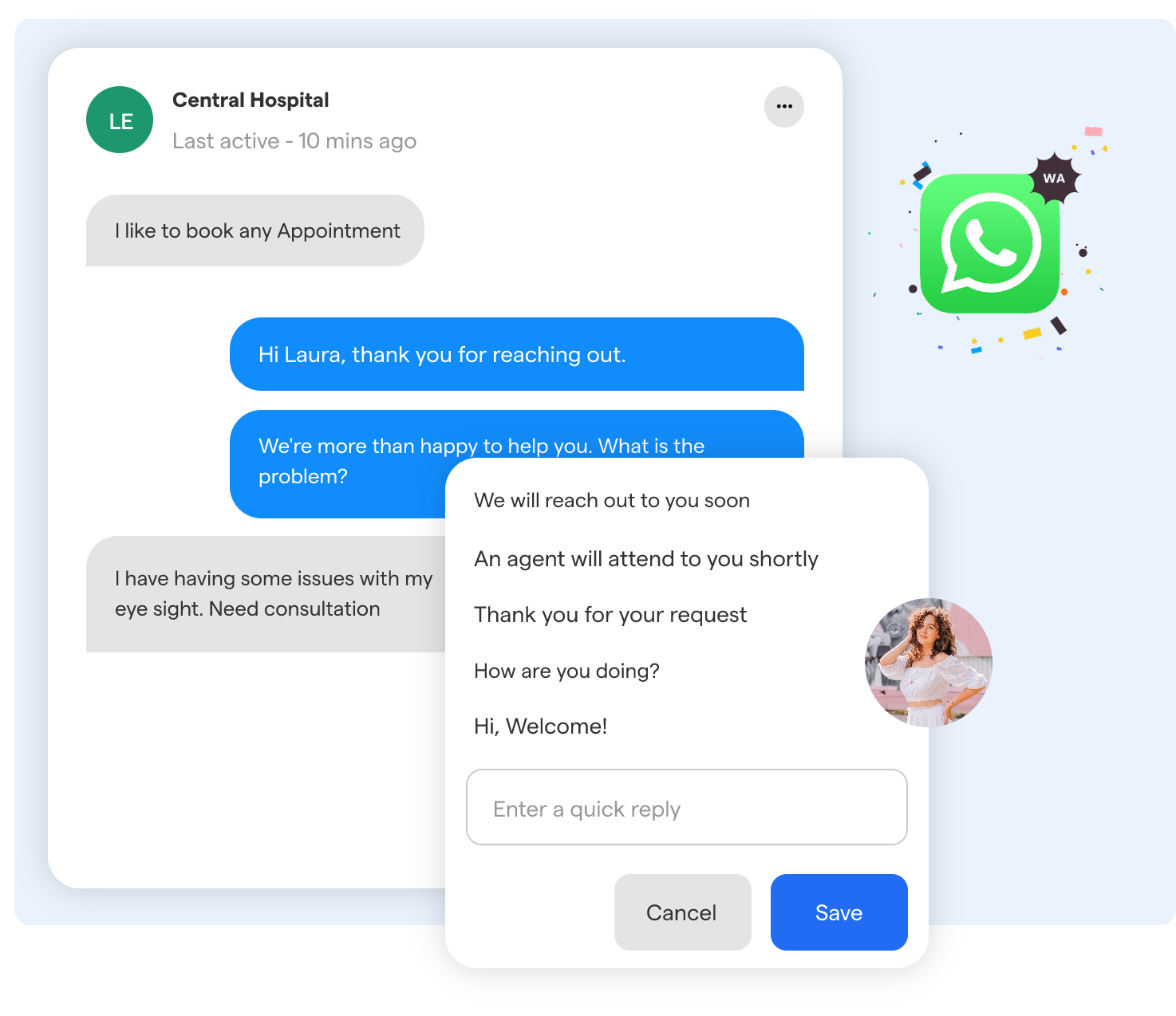
The Benefits of Healthcare Chatbots
The use of healthcare chatbots is revolutionizing how patients receive care. With their ability to provide round-the-clock access to information, scheduling, and even triage, chatbots are making healthcare more convenient and efficient.
Here are some key benefits of healthcare chatbots:
Improved Access to Care
One of the primary benefits of healthcare chatbots is the increased accessibility they provide. With chatbots, patients can receive medical advice and information anytime, anywhere.
This makes it easier for people to manage their health, and reduces the need for in-person visits.
Increased Convenience
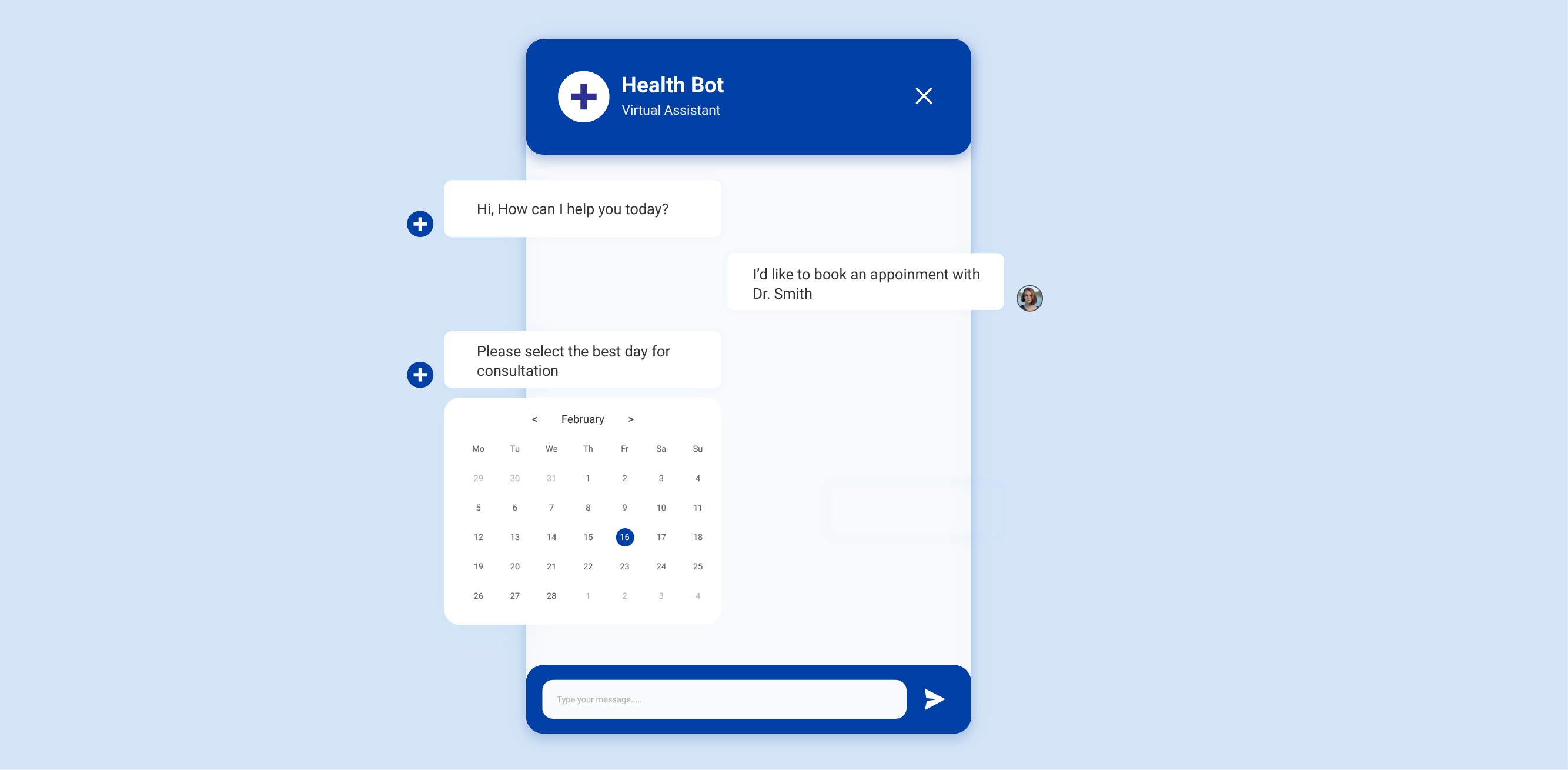
Healthcare chatbots make the patient experience as convenient as possible. For example, doctors can use chatbots to schedule appointments, refill prescriptions, and even conduct virtual consultations.
It saves patients time and reduces the hassle of navigating complex healthcare systems.
Better Management of Chronic Conditions
For patients with chronic conditions, healthcare chatbots can be especially helpful. Chatbots can provide reminders for taking medication, track symptoms, and provide information about managing their condition.
It can help improve patient outcomes and reduce the risk of complications.
Cost-Effective
The use of healthcare chatbots can also help reduce healthcare costs. By providing patients with quick access to information and reducing the need for in-person visits, chatbots can help reduce the burden on healthcare systems.
Additionally, using chatbots can help reduce the time and resources needed to manage administrative tasks, freeing healthcare professionals to focus on more important tasks.
Improved Patient Outcomes
Ultimately, healthcare chatbots aim to improve patient outcomes.
Chatbots can help improve health literacy, increase patient engagement, and reduce the risk of complications by providing patients with round-the-clock access to information and support.
Example of Healthcare Chatbots in Action
One example of a healthcare chatbot in action is the MySymptoms chatbot developed by Babylon Health.
It uses artificial intelligence (AI) to help patients identify symptoms and provide information about possible diagnoses and treatments.
Another example is the HealthTap chatbot, which provides patients with access to information about health conditions and the ability to connect with licensed healthcare professionals.
The Bad and Ugly
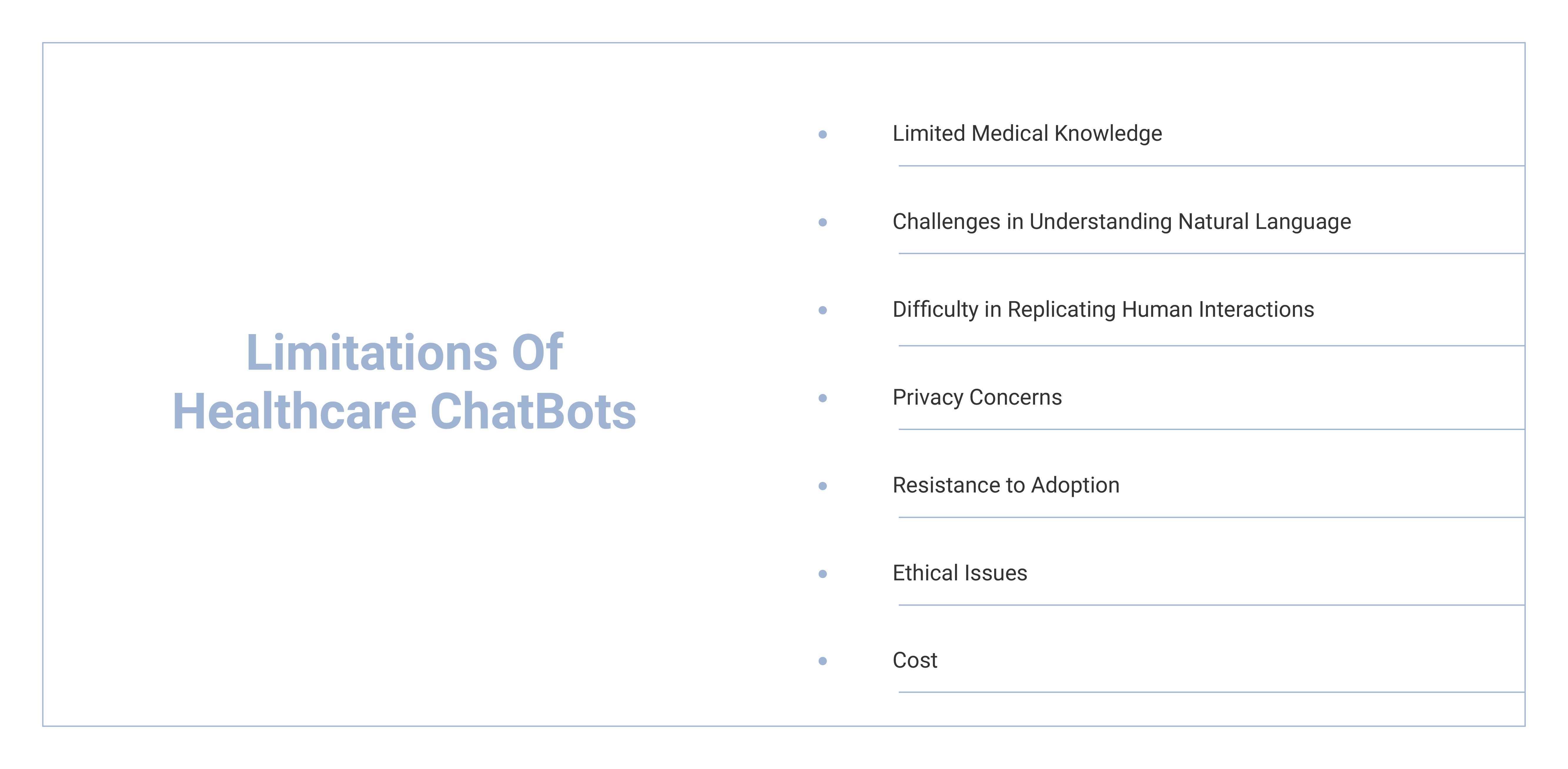
Limited Medical Knowledge
One of the biggest limitations of healthcare chatbots is their limited medical knowledge. Despite being trained on vast amounts of medical data, chatbots can still not diagnose complex medical conditions or provide personalized medical advice.
They can only provide general information based on the available data and cannot replace a human doctor.
Challenges in Understanding Natural Language
Another limitation of healthcare chatbots is their ability to understand natural language.
Chatbots are designed to understand specific keywords and phrases and can sometimes misinterpret user questions or provide incorrect answers.
It can lead to confusion and frustration among users who expect accurate information from their healthcare chatbot.
Difficulty in Replicating Human Interactions
Healthcare chatbots are also limited by their inability to replicate the emotional and empathetic connections that human doctors can provide.
Patients may feel less confident in their health information when they receive it from a chatbot and may prefer speaking with a human doctor.
Privacy Concerns
Privacy concerns are also a limitation of healthcare chatbots. Patient information is sensitive and must be protected at all times.
However, chatbots can be vulnerable to cyber attacks or data breaches, which could steal sensitive patient information.
Resistance to Adoption
Finally, resistance to adoption is a major limitation of healthcare chatbots. Many patients may be skeptical of chatbots and prefer to speak with a human doctor.
Healthcare providers may also be hesitant to adopt chatbots due to concerns about the technology's accuracy and ability to provide the same level of care as a human doctor.
Ethical Issues
Additionally, when chatbots are used to replace human doctors, ethical issues can arise.
Some patients may feel that chatbots are not qualified to provide medical advice and may be uncomfortable receiving medical advice from a machine.
Cost
Implementing and maintaining a healthcare chatbot can be expensive, and many healthcare providers may not have the resources to invest in this technology.
Healthcare Chatbots: Use Cases
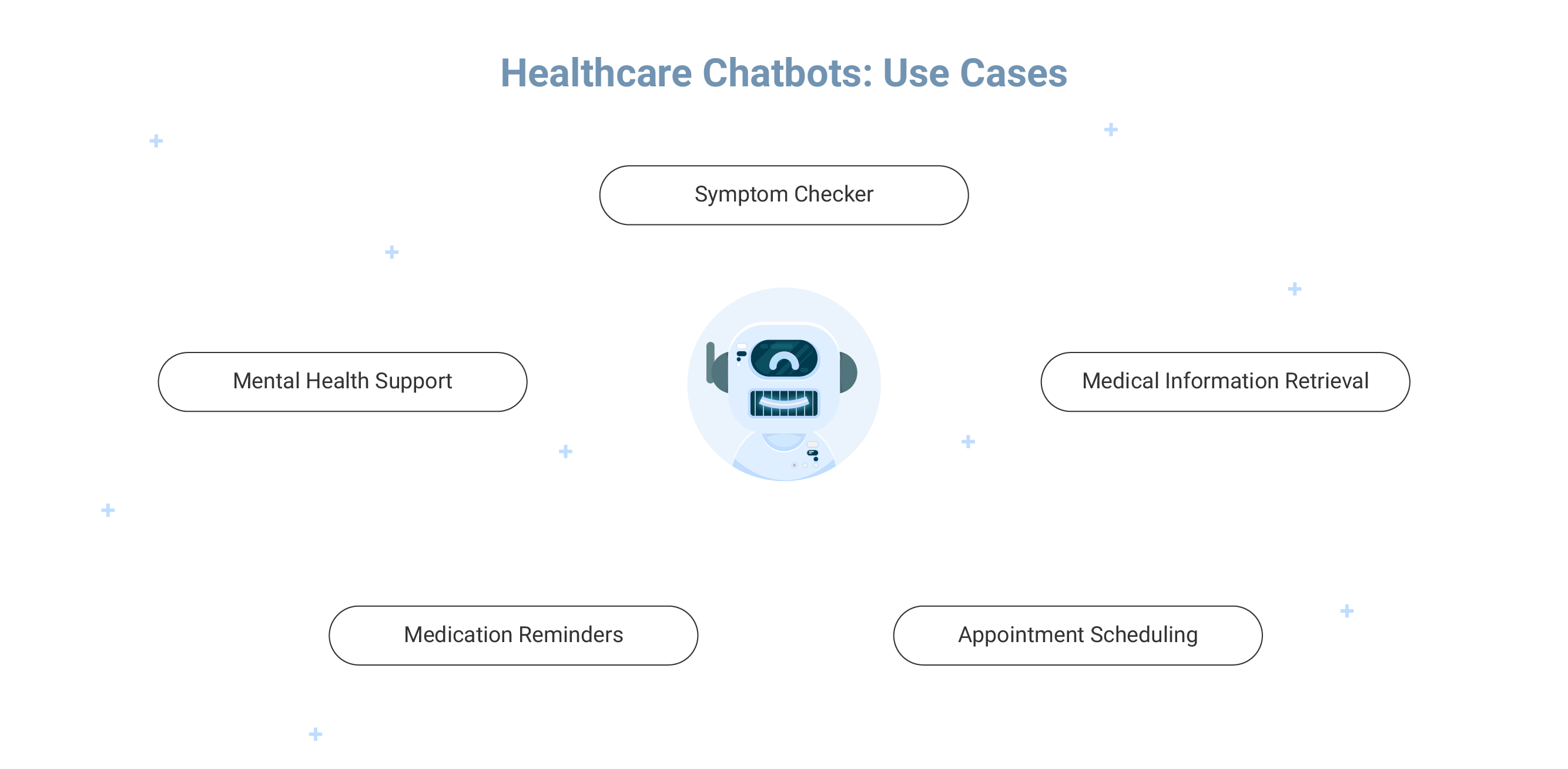
Healthcare chatbots are AI-powered virtual assistants that assist patients and healthcare providers with various medical-related tasks and queries. The following are some of the use cases of healthcare chatbots in the industry:
Symptom Checker
A symptom checker chatbot helps patients identify their symptoms and provides them with possible conditions and treatment options. For instance, the chatbot might ask questions about the patient's symptoms, such as location, duration, and severity, to determine a possible diagnosis.
Example: Ada, a popular health app, provides a symptom checker chatbot that helps users identify what's wrong with them and provides personalized health recommendations.
Medical Information Retrieval
Patients can use healthcare chatbots to retrieve information about diseases, treatments, and medications. For example, a patient can ask a chatbot about the side effects of a particular medication or the causes of a particular condition.
Example: The Mayo Clinic chatbot provides users with credible, accurate health information, including information about specific diseases and treatments.
Appointment Scheduling
A chatbot can assist patients in scheduling appointments with healthcare providers, such as doctors, dentists, and specialists. Patients can ask the chatbot for available appointment times, book appointments, and receive reminders about their upcoming appointments.
Example: ZocDoc, a popular healthcare app, offers a chatbot that helps patients find and book appointments with healthcare providers.
Medication Reminders
Doctors can use chatbots to remind patients to take their medications, track their progress, and provide information about their medications. For instance, a chatbot might send reminders to take medication, ask about symptoms and side effects, and provide tips for managing side effects.
Example: Medisafe, a popular medication management app, offers a chatbot that helps users keep track of their medications, reminds them to take their pills, and provides information about their medications.
Mental Health Support
Healthcare chatbots can provide mental health support and resources to patients. For instance, a chatbot might offer coping strategies and relaxation techniques and connect patients with mental health resources.
Example: Woebot, a mental health chatbot, provides patients with support and resources for managing their mental health.
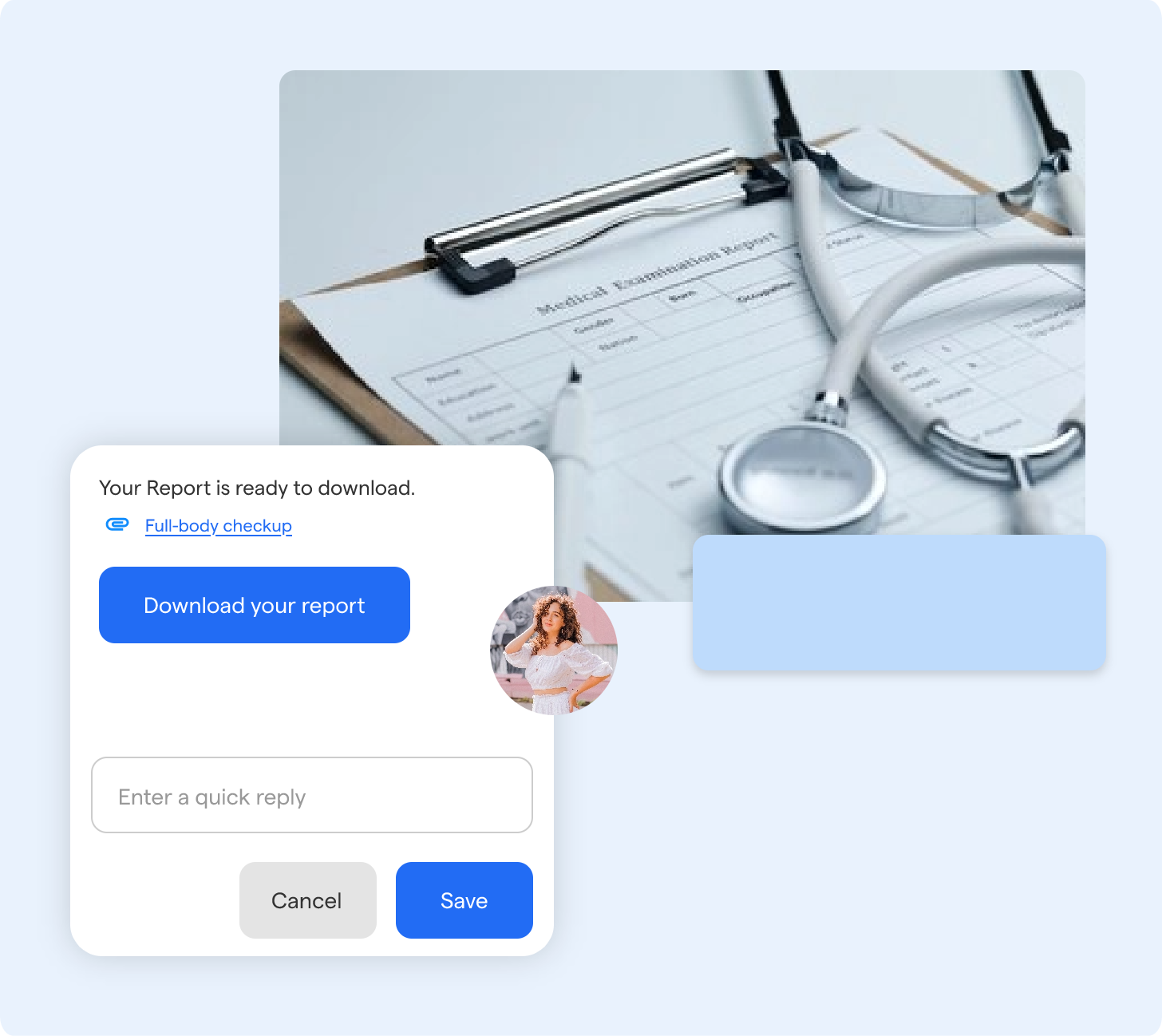
Impact of Healthcare Chatbots on Healthcare Professionals
Healthcare chatbots are increasingly being adopted in the healthcare industry, significantly impacting healthcare professionals. This impact can be seen in several areas, including:
Time Savings
One of the primary benefits of healthcare chatbots for healthcare professionals is the time savings they provide.
By handling repetitive and administrative tasks, such as appointment scheduling and prescription renewals, healthcare chatbots free up valuable time for healthcare professionals to focus on more pressing and complex patient care issues.
Improved Workflow
Healthcare chatbots can improve the workflow of healthcare professionals by streamlining processes and improving the efficiency of various tasks.
Increased Access to Care
Healthcare chatbots can also increase access to care by providing patients with 24/7 access to medical information and resources. It improves patient outcomes, as patients are better equipped to manage their own health and seek care when needed.
Enhanced Collaboration
Healthcare chatbots can also enhance collaboration among healthcare professionals by providing a centralized platform for exchanging information and coordinating patient care.
Reduced Errors
Healthcare chatbots can also reduce errors in the healthcare system by automating repetitive and administrative tasks, such as appointment scheduling and prescription renewals. It can lead to improved patient outcomes and reduced healthcare costs.
Enhanced Patient Engagement
Finally, healthcare chatbots can enhance patient engagement by providing patients with convenient and accessible resources for managing their health. It can lead to improved patient outcomes, increased patient satisfaction, and reduced healthcare costs.
Conclusion
Healthcare chatbots have the potential to revolutionize the way patient care is delivered in 2023 and beyond.
With their ability to provide 24/7 access to medical information, assist with self-care, and streamline processes, healthcare chatbots will have a significant impact.
As technology continues to advance, it is likely that healthcare chatbots will become even more sophisticated, providing a wide range of benefits to both healthcare professionals and patients alike.
The future of patient care is promising, and healthcare chatbots will play a major role in shaping that future.
Suggested Reading:
Frequently Asked Questions (FAQs)
What is a healthcare chatbot?
A healthcare chatbot is an AI-powered virtual assistant that helps patients manage their health by providing relevant information and support through messaging platforms.
A chatbot uses ML, AI and NLP to understand the user's query and give an appropriate response.
What are the three basic types of medical chatbots?
The three basic medical chatbots are triage chatbots, diagnostic chatbots, and informational chatbots.
Triage chatbots help patients determine their symptoms' severity and guide them on when to seek medical attention.
Diagnostic chatbots use AI to diagnose medical conditions based on patient symptoms.
Informational chatbots provide patients with general health information and support.
What is an example of using AI chatbots in healthcare?
An example of using AI chatbots in healthcare is symptom checker chatbots that assist patients in determining the cause of their symptoms.
These chatbots ask questions about the patient's symptoms, medical history, and lifestyle to list possible conditions and suggest the next steps for seeking medical attention.
Can healthcare chatbots diagnose medical conditions?
While some advanced healthcare chatbots can diagnose medical conditions based on patient symptoms, it is essential to note that they are not intended to replace a medical professional.
Chatbots are a tool to support patients in determining the cause of their symptoms and seeking appropriate medical attention.
Are healthcare chatbots secure and private?
Healthcare chatbots are designed with security and privacy in mind. They typically use encrypted messaging to protect patient information and comply with healthcare regulations such as HIPAA.
However, it is important for patients to thoroughly research a chatbot before using it and ensure it is reputable and secure.
How do healthcare chatbots benefit patients?
Healthcare chatbots offer patients several benefits, including convenient access to health information and support, reduced wait times for medical attention, and improved overall patient experience.
They also help patients manage their health by providing reminders for appointments and medication and tracking symptoms and progress.
How do healthcare chatbots benefit medical professionals?
Healthcare chatbots can help medical professionals by reducing administrative tasks, improving patient satisfaction, and providing valuable data for medical research and analysis.
Chatbots can also support medical professionals in triaging patients and guiding them when to seek medical attention.
How do healthcare chatbots impact the healthcare industry?
Healthcare chatbots are revolutionizing how patients manage their health and seek medical attention.
They are reducing the burden on the healthcare system by providing patients with access to information and support, reducing wait times, and improving the overall patient experience.
Additionally, they provide valuable data for medical research and analysis.
Does insurance cover healthcare chatbots?
Insurance coverage of healthcare chatbots depends on the individual insurance plan and the specific chatbot being used.
Some insurance plans may cover a chatbot's cost, while others may not. Patients should check with their insurance provider to determine if the chatbot they wish to use is covered under their plan.


